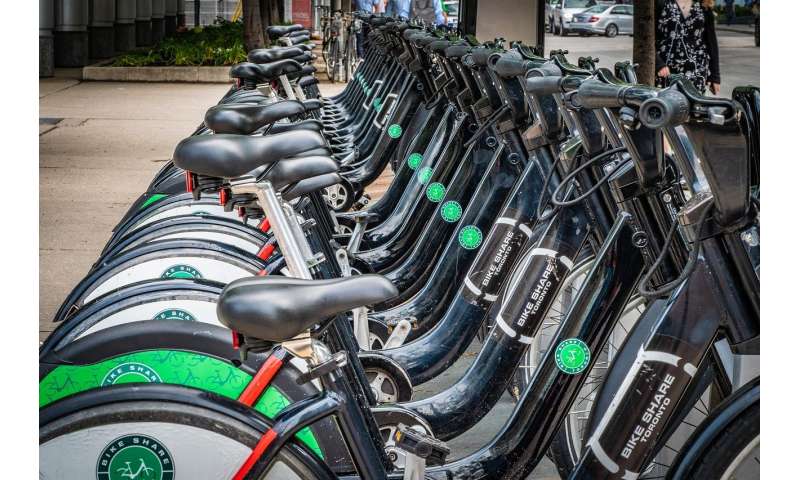Study: With policy development, the sharing economy can be part of a green recovery post-COVID-19

The sharing economy could be an important part of a green recovery post-COVID-19, but additional insights are needed for policy development. We should avoid idealizing the sharing economy and ensure sustainable sharing organizations can thrive. We define sustainability in line with the U.N. definition of sustainable development. Our recently published, peer-reviewed empirical study suggests a selection process by powerful investors may interfere with the healthy operation of the sharing economy.
The sharing economy has not necessarily been synonymous with sustainable development, and has even caused problems. For example, car-sharing schemes such as Uber and Lyft have conflicted with taxi services. Home sharing systems such as Airbnb often disturb neighborhood life, among other issues. At the same time, these for-profit firms open up opportunities for more autonomous employment opportunities and increased asset utilization. And consumers are demanding these additional choices offering increased market competition. Sharing can be more environmentally friendly, such as when we car pool or use bike-share systems.
One problem is that the "sharing economy" is an umbrella term encompassing a wide range of types of organizations. Libraries offer sharing systems for books, movies and other materials, but they are usually run on a nonprofit basis funded by governments and universities. Libraries co-exist with book stores and other for-profit entertainment distribution systems without controversy. They are examples of what is normally called sharing, freely offering materials to be borrowed by anyone. This is an egalitarian distribution of benefits to the widest possible set of stakeholders. The sharing economy is associated with this egalitarianism.
However, the new disruptive sharing economy firms are sometimes accused of exploiting workers. These workers are not receiving benefits and protection normally afforded in regular jobs. Meanwhile, CEOs of these sharing economy firms look forward to IPOs that build shareholder wealth. So, these firms aim to make the rich richer, increasing inequality. These are vastly different models compared to libraries. We need to unpack the differences to see that sustainable types of sharing survive and other types are understood for what they are. Policy may intervene to avoid increasing inequality.
Our statistical study shows that investors are inclined to choose incumbent firms when sharing economy firms are smaller. This means that most sharing economy firms will be passed over and will not receive the cash infusions they need to grow. When the sharing economy firms are larger and established, investors are more interested in them. At that point, the sharing economy business models have advantages because of the social networks and greater market reach. For example, Uber only has to develop an application with software systems to connect drivers with customers. Most capital investment is born by drivers who own their cars. This allows Uber to potentially expand rapidly anywhere there are idle car owners. Local taxi companies are not set up to compete with this high-tech model of convenience and expansion. The comparison is similar for Airbnb against hotels.

But this is all about profit, growth, and stock price increases, and not much about sharing or sustainable development. The sharing firms more likely to produce societal benefits are unlikely to receive investor notice. Then they struggle to grow organically or remain small. Communauto in Canada as compared to U.S.-based Zipcar is an example where the two for-profit firms are almost exactly alike in terms of the service they offer. But these firms are worlds apart in terms of sustainability. Communauto is built on climate-change-reducing action aimed at removing cars from the road. This Quebec-based sharing company even partners with public transit and encourages other low-carbon means of transportation. Zipcar is for-profit motivated and was bought by Avis, a regular car rental company. We need the Communautos of the world for sustainable development.

If investors powerfully boost the non-sharing firms and more profitable pseudo-sharing firms to domination, then we need public policy to step in. We have to boost the sustainable types of sharing economy firms, too. The sustainable firms offer increased competition for consumers' benefit and more value, but like a library or Communauto, the value is more broadly distributed across society and/or the environment. The value does not only go into investors' pockets, so they are less motivated to invest. If we want a sustainable sharing economy, we need creative policy to address this imbalance. Let's ask our elected officials to think about policy and implementation plans for our post-COVID green recovery.
This story is part of Science X Dialog, where researchers can report findings from their published research articles. Visit this page for information about ScienceX Dialog and how to participate.
More information:
Deborah de Lange et al. Investor preferences between the sharing economy and incumbent firms, Journal of Business Research (2020). DOI: 10.1016/j.jbusres.2020.05.007
Bio:
Dr. de Lange is Associate Professor of Global Management at Ryerson University. Her research focuses on the intersection of strategic organizational and international entrepreneurship theory for climate change mitigation and sustainable development in support of the UN Sustainable Development Goals.